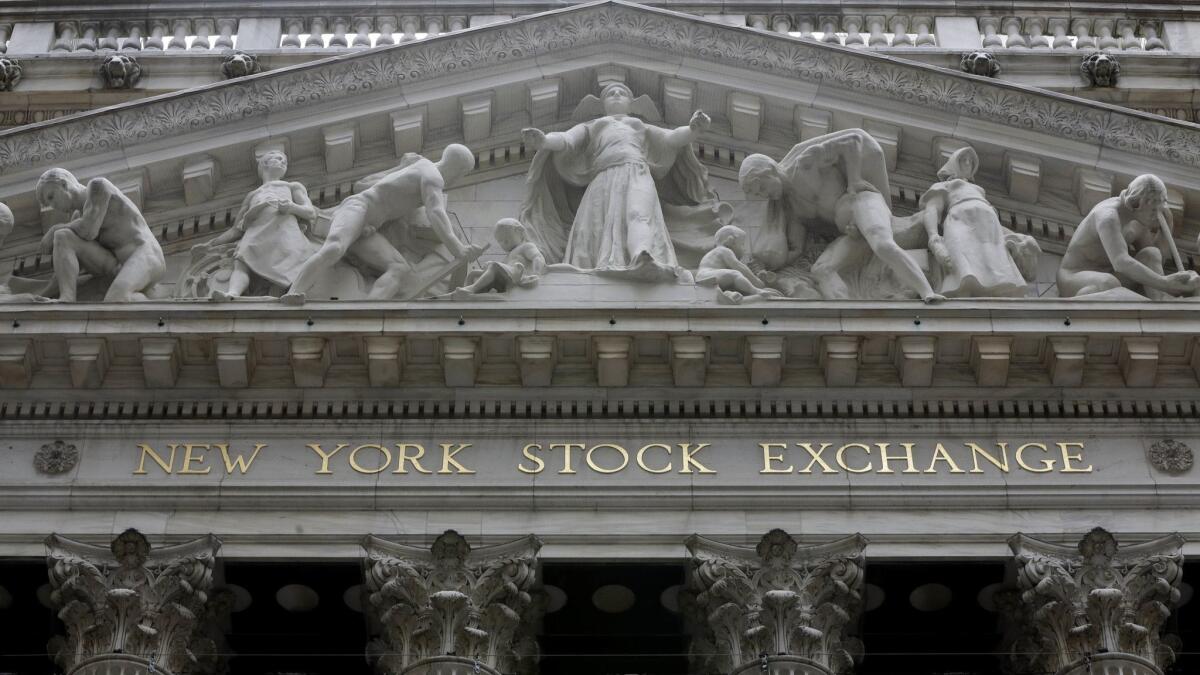Stocks climb, notching fourth straight week of gains

U.S. stocks jumped Friday as renewed hopes for progress in U.S.-China trade talks helped the market finish the week with another strong gain.
Indexes jumped after Bloomberg News reported that China’s government offered to buy more goods and services from the United States, potentially eliminating its trade deficit by 2024. For investors, the encouraging news on trade built on recent positive signs for the U.S. economy and indications from the Federal Reserve that it will be patient when considering future interest rate hikes.
The Standard & Poor’s 500 index has risen 6.5% so far this year and the Dow Jones industrial average is up 5.9%, a surprisingly strong showing after 2018’s punishing end.
Technology and industrial companies made some of the biggest gains Friday, while banks rose after a round of solid fourth-quarter earnings reports. Oil and copper prices rose, while gold and bond prices fell. Those are all signs that traders felt more optimistic about global economic growth.
Over the last few days, investors grew steadily more hopeful that the United States and China are narrowing their differences over trade. On Wednesday the Chinese government said the top trade envoys from both countries will meet at the end of January.
“What you can see that is significant is that both sides are trying,” said Tom Martin, senior portfolio manager of Globalt Investments. “Everybody feels like they’ve now made their point” after the two nations spent most of 2018 staking out positions and occasionally making threats and raising tariffs.
The S&P 500 climbed 34.75 points, or 1.3%, to 2,670.71. The Dow jumped 336.25 points, or 1.4%, to 24,706.35. The tech-heavy Nasdaq composite advanced 72.76 points, or 1%, to 7,157.23.
Stock indexes have surged since reaching a low point Christmas Eve. The S&P 500 has risen for four weeks in a row, gaining at least 1.9% each week. It climbed 2.9% this week. The last time the index rose at least 1.5% for four weeks in a row was in early 2009, in the wake of the financial crisis, said LPL Financial senior market strategist Ryan Detrick.
The U.S. trade imbalance with China has been a topic of constant complaints from President Trump. That deficit grew to a record $323.3 billion in 2018, and eliminating it could mean hundreds of billions of dollars in increased sales for U.S. companies. The two countries have raised taxes on billions of dollars’ worth of each other’s goods while disagreeing on topics including trade deficit, Beijing’s manufacturing plans and U.S. complaints that China steals technology from foreign companies.
Stocks sank in late 2018 as investors worried that global economic growth, and U.S. growth in particular, would slow significantly. Threats including the U.S.-China trade war, rising interest rates in the United States, slowing growth in China and Europe, and unstable political situations such as Britain’s withdrawal from the European Union all made it seem like 2019 could be a disappointing year. Some investors felt a recession was possible.
But now they’re starting to think it won’t get that bad. There are signs that trade talks are progressing. The U.S. economy doesn’t appear to have slowed much. China is working to perk up its economy. Resolving the trade war would also resolve an obstacle to growth for the global economy and corporate profits. The S&P 500, the main benchmark for U.S. stocks, fell 19.8% from late September to late December and has recovered more than half of those losses.
On Friday, trucking and logistics company J.B. Hunt Transportation jumped 6.2% to $106.11 and railroad company Kansas City Southern climbed 6.1% to $110.52 after their fourth-quarter reports.
Faster economic growth would mean more demand for oil, and prices climbed. U.S. crude advanced 3.3% to $53.80 in New York. Brent crude, used to price international oils, rose 2.5% to $62.70 a barrel in London.
Bond prices fell. The yield on the 10-year Treasury note rose to 2.79% from 2.74%. High-dividend stocks such as utilities — which tend to rise when investors are worried about the economy — lagged behind the rest of the market.
Tesla sank 13% to $302.26 after the company said it would cut 7% of its jobs. Chief Executive Elon Musk said the cuts are meant to reduce costs as the company lowers the price for its cars. He said in a note to staff that the road ahead is “very difficult.”
Tiffany climbed 5.3% to $89.82 even though the luxury jeweler said holiday shoppers and Chinese tourists spent less on its bling.
V.F. Corp. jumped 12.4% to $82.34 after the maker of brands including Timberland and North Face raised its forecasts following a strong quarter.
Netflix fell 4% to $339.10 after the streaming video service said its growth is slowing in the United States.
Schlumberger climbed 8.1% to $44.73 after the world’s largest oil field service company reported more revenue than analysts expected.
Nautilus plunged 40.5% to $7.02 after the fitness equipment maker said its fourth-quarter profit and sales will fall far short of expectations.
CVS Health rose 3.4% to $65.52 after the company resolved a dispute with Walmart, which will continue to participate in CVS’ prescription drug network.
Wholesale gasoline rose 1.6% to $1.45 a gallon. Heating oil rose 1.6% to $1.92 a gallon. Natural gas climbed 2% to $3.48 per 1,000 cubic feet.
Gold fell 0.8% to $1,282.70 an ounce. Silver fell 0.9% to $15.40 an ounce. Copper rose 1.5% to $2.72 a pound.
The dollar rose to 109.79 yen from 109.23 yen. The euro fell to $1.1370 from $1.1390.
Major stock indexes in Europe and Asia gained ground.
More to Read
Inside the business of entertainment
The Wide Shot brings you news, analysis and insights on everything from streaming wars to production — and what it all means for the future.
You may occasionally receive promotional content from the Los Angeles Times.









